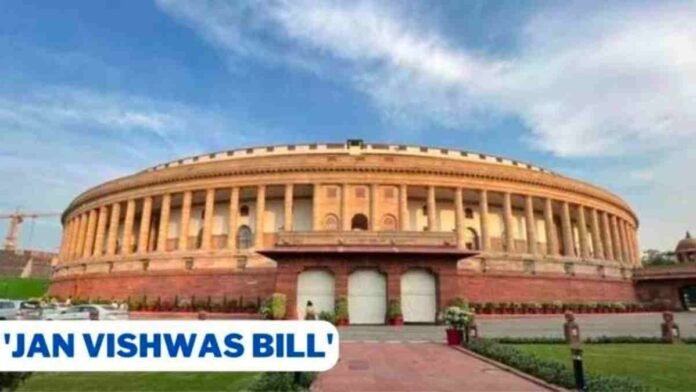The Jan Vishwas Bill, 2023, will decriminalize relatively minor offenses under 183 sections of 42 Acts in an effort to facilitate ease of doing business. The measure intends to abolish imprisonment for certain acts, including those covered by the Post Office Act of 1898, and change fines into penalties. Additionally, it suggests the development of adjudicating officials, Appellate Authorities, and periodic increases in fines and penalties as well as the pragmatic review of fines and penalties.
The Jan Vishwas (Amendment of Provisions) Bill, 2023 was approved by the Parliament on Wednesday during the present monsoon session in an effort to facilitate business. By amending 183 sections of 42 Acts, the measure attempts to facilitate ease of doing business by decriminalizing minor offenses. The Rajya Sabha approved the measure on Wednesday by voice vote. On July 27, the Lok Sabha approved it.
According to Piyush Goyal, minister of commerce and industry, the law will make conducting business easier by decriminalizing a variety of offences. A working committee had been created to carry out the idea, the minister told the Upper House. Representatives from business chambers, trade groups, lawyers, legal experts, and representatives from seven ministries make up the working group. Additionally, it includes officials from the Central Pollution Control Board, National Housing Bank, and National Bank of Agriculture and Rural Development.
Understand the Jan Vishwas bill
The measure proposes to transform a number of fines into penalties, removing the need for court prosecution to impose sanctions. Additionally, numerous offenses are no longer punishable by jail. The Post Office Act of 1898 is being repealed in its entirety.
The Jan Vishwas bill calls for the decriminalization of 183 provisions across 42 Central Acts that are overseen by 19 Ministries and Departments.
It is suggested that decriminalization be accomplished in the following ways:
Some clauses provide for the removal of both jail time and/or fines.
In a few clauses, it is recommended to keep the fine but eliminate the sentence of imprisonment.
It is recommended to eliminate imprisonment and increase fines in a few sections.
In various clauses, it is suggested to change imprisonment and fines to penalties.
It is planned to establish compounding of offenses in a few clauses.
The law suggests following actions to ensure that the aforementioned is carried out effectively.
Establishment of Adjudicating Officers: Practical modification of fines and punishments appropriate with the offense committed
Creating Appellate Authorities
increasing the amount of fines and penalties on a regular basis
Conclusion:-
By making minor offenses under 183 sections of 42 Acts non-criminal, the Jan Vishwas (Amendment of sections) Bill, 2023 seeks to facilitate ease of doing business. On July 27, the Lok Sabha and Rajya Sabha passed the legislation by voice vote. A working committee of business chambers, industry groups, attorneys, and seven ministry officials will lead the initiative. The law proposes to eliminate judicial prosecution for numerous violations, change a number of fines to penalties, and abolish incarceration as a penalty for a number of offenses. The proposed legislation calls for actions such sensible revisions to fines and penalties, the appointment of officers, the creation of appellate agencies, and cyclical rises in fines and penalties.



